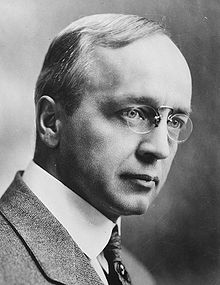Edwin Kemmerer
| Edwin Walter Kemmerer | |
|---|---|
 |
|
| Born | June 29, 1875 |
| Died | December 16, 1945 (aged 70) |
| Nationality | American |
| Influences | Jeremiah Jenks |
| Influenced |
Frederick Albert Cleveland Frank Whitson Fetter |
Edwin Walter Kemmerer (June 29, 1875, Scranton, Penn. – December 16, 1945 Princeton, N.J.) American economist, became famous as a "money doctor" or economic adviser to foreign governments all around the world, promoting plans based on strong currencies and balanced budgets.
He graduated with honors and a Phi Beta Kappa key from Wesleyan University, and earned his Ph.D. from Cornell, then, at 28, was appointed Financial Adviser to the U.S. Philippine Commission. In 1912 he became a professor in Princeton, where he was made the first director of its new International Finance Section; by then Kemmerer had a well established reputation as an international 'money doctor'.
All of the plans created by economic advisors like Kemmerer were aimed "towards the establishment of an internationally interconnected monetary and credit system based on stable national currencies in fixed value relationship with gold and other gold currencies." Consequently, the plans required among other things, central bank independence, the payment of all debts and balanced state budgets.
R. Nötel, in his essay on the International Credit and Finance of Eastern Europe, complains that the advice of these "money doctors" was "sometimes discordant", adding that their plans were written not only to have the debtors comply with the rules of the international financial system, but also to obtain the approval of much needed loans.
As a "money doctor" Kemmerer was not alone: in Poland he was followed by Charles Dewey; Romania had the Frenchmen Charles Rist and Roger Auboin; and for Hungary and Germany, the Americans Jeremiah Smith Jr and S. Parker Gilbert, respectively.
After two failed attempts at bringing "galloping" inflation under control, in April 1924 a somewhat satisfactory stabilization scheme was established that reigned in inflation and laid the foundations for a modern financial system. This came at the cost of deflation and increasing political instability, exacerbated by the expiry in 1925 of the Upper Silesia convention obliging Germans to buy 6 million tons of Polish coal, which made for a quarter of Polish exports.
The political and increasingly economic instability came to an end with the coup d'état that brought general Pilsudski in May 1926, a popular military hero, to power. His increasingly right wing politics appealed to American diplomats and bankers, and the US at the time was attempting to "rebuild Europe's war-torn economy and thereby protect crucial agricultural and industrial markets, block the spread of Bolshevism, and ease the danger of renewed war and revolution."
...
Wikipedia
